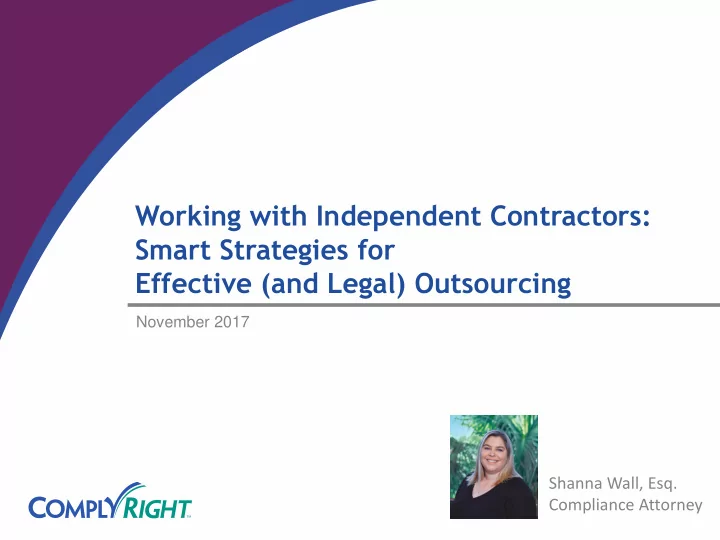

Working with Independent Contractors: Smart Strategies for Effective (and Legal) Outsourcing November 2017 Shanna Wall, Esq. Compliance Attorney
Working with Independent Contractors: Smart Strategies for Effective (and Legal) Outsourcing Welcome! Before we get started … Use the chat box on the left to ask questions If you are having audio trouble, please message us in the chat box, and we will do our best to assist you
What We’ll Cover Today Why proper classification matters What can happen if you get it wrong What it takes to establish a contractor relationship under the law Helpful tips to ensure you don’t cross the line from contractor to employee Critical components every contractor agreement should have
Quick Poll Question Do you currently use independent contractors to help run your business?
What Is an Independent Contractor?
What Is an Independent Contractor? Independent contractors (ICs) are workers who are responsible for delivering certain results and maintain full control over the means/methods of achieving those results. Employees are workers who do what you tell them, when you tell them and how you tell them to do it. ( You maintain control over how they do their work.)
What Is an Independent Contractor? Often referred to as freelancers, consultants, project workers, contract workers or even “1099ers” No such thing as a 1099 employee ! Using independent contractors is a practical and common tactic for U.S. businesses Using ICs gives you flexibility, limits obligations, reduces administrative burdens and saves money
Using Independent Contractors Using independent contractors is not a legitimate way to avoid complying with labor and tax laws You can’t treat everyone as an independent contractor You must follow the rules for classifying workers and take steps to get it right
Why Does It Matter?
Why Does It Matter? • Many federal and state agencies monitor
Why Does It Matter? Back taxes (Social Security, Medicare, unemployment) plus penalties Back wages, including overtime pay, for up to three years (sometimes doubled) plus penalties and possible employee lawsuits Back premiums for workers’ comp insurance for as many years as the (worker) relationship has existed, plus possible employee lawsuit
Why Does It Matter? National study found that 30% of businesses get it wrong Use of independent contractors has been rising steadily Agencies are not only cracking down … they’re sharing information
What Are the Rules?
What Are the Rules? IC status is determined by certain tests : Different federal and state agencies and different courts use different tests Rules overlap but there are meaningful distinctions In all cases, the totality of the circumstances is what matters
What Are the Rules? “Right to Control” (or Common Law) Test: Looks at degree of control exerted over the worker Considers 3 categories of control: 1. Behavioral Control 2. Financial Control 3. Relationship of the Parties
What Are the Rules? “Right to Control” Test: Behavioral Control Does the business instruct the worker on how, when and where to do the work? Does the business provide training to do the work in a particular way? Is performance closely monitored or documented?
What Are the Rules? “Right to Control” Test: Financial Control Are business expenses paid by the worker? Does the worker use his/her own equipment? Does the worker have other customers? Is the worker paid by the project?
What Are the Rules? “Right to Control” Test: Relationship Is there a written contract specifying IC relationships? Is the worker eligible for benefits? Is the relationship temporary or permanent? Does the worker provide core business services?
What Are the Rules? “Economic Reality” Test: Focuses on economic relationship with the worker Preferred by the Department of Labor and OSHA Comprised of six factors
What Are the Rules? “Economic Reality” Test: 1. Right to Control: Does the worker control how the work is performed? 2. Investment : Who pays for equipment, materials and helpers? 3. Length of Relationship: Is the relationship permanent or temporary?
What Are the Rules? “Economic Reality” Test: 4. Skill: Does the work require special skills? 5. Level of Risk : Does the worker’s ability to make money depend on his/her managerial skills? 6. Level of Integration: To what extent are the worker’s services an integral part of the employer’s business?
Quick Poll Question How confident are you that you are following all of the required tests for an IC?
How to Protect Yourself
How to Protect Yourself Sign an Independent Contractor Agreement that includes: Payment amounts and terms Specific end date or concrete deliverable(s) Contractor is responsible for tools, equipment, etc. Contractor can pursue other customers (confidentiality, non-compete clauses okay) Liability clause
How to Protect Yourself DON’T: Let the worker decide he/she is an IC Set or track work hours Provide company business cards or email address Do performance reviews or take disciplinary action Provide PTO or other benefits Provide helpers or support workers
How to Protect Yourself DON’T : Pay hourly or salary (project-based pricing is best) Pay worker out of payroll system or account Withhold taxes or issue a W-2 Contract former employees for similar duties Use an IC for an extended period of time
How to Protect Yourself DO: Choose contractors with skills to work independently, without training or supervision Treat as a vendor under accounts payable Get a Form W-9 before work begins Issue and file a 1099-MISC (never a W-2!) at tax time
How to Protect Yourself Ideally, you should: Work with ICs who have a business name and EIN Choose ICs who have other customers Write checks to the business name, not the individual Request proof of liability insurance
Let’s Review!
ComplyRight Solutions Easily File and Deliver 1009 Forms Online For more info visit
Questions
Recommend
More recommend